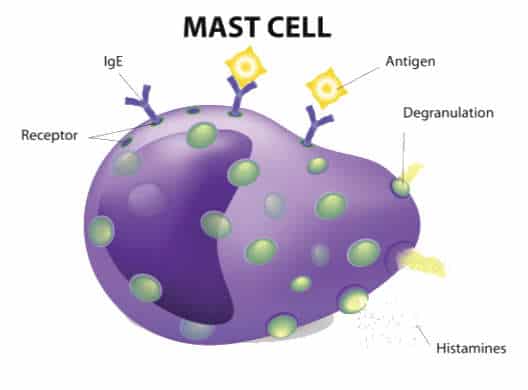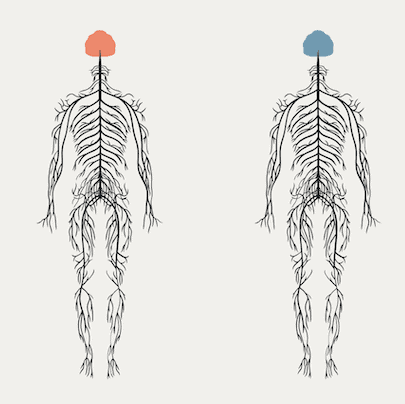Mast Cell Activation Syndrome
Mast Cell Activation Syndrome and Your Nervous System
Living with mast cell activation syndrome is often more than a medical condition, it is a daily negotiation with your body. One day you might be fine, the next you are dealing with a flare that can appear out of nowhere. Light feels too bright. The smell of perfume makes your chest tighten. A favourite food suddenly leaves you bloated, dizzy, or covered in hives. It is unpredictable and, for many, exhausting.
You might already know that mast cell activation syndrome, often called MCAS, involves over-reactive immune cells. What is not talked about enough is how deeply this condition is linked to the state of your nervous system. When your body is stuck in a high-alert mode, mast cells are more likely to misread everyday things as threats. Over time, this creates a cycle where stress fuels symptoms, and symptoms fuel stress.

Understanding Mast Cell Activation Syndrome

Mast cells are part of your immune defence. They live in almost every tissue, including skin, gut, lungs, bladder, connective tissue, and even around blood vessels and nerves. Their role is to protect you by detecting problems and releasing chemical mediators, such as histamine, to deal with the threat.
In MCAS, mast cells become overly sensitive. Instead of reacting only to genuine danger, they respond to harmless signals. This constant overreaction sends waves of inflammation through the body, leading to a wide variety of symptoms.
Because mast cells are everywhere, MCAS symptoms can look very different from one person to another. You might share a diagnosis with someone who has completely different challenges, which can make the condition harder to recognise and manage.
MCAS Symptoms
Common MCAS symptoms can include:
- Flushing, itching, rashes, hives, or swelling
- Digestive issues such as abdominal pain, diarrhoea, nausea, or reflux
- Brain fog, poor concentration, or memory problems
- Fatigue or low stamina
- Bladder pain, frequency, or urgency
- Anxiety, mood swings, or feelings of being “on edge”
- Sensitivity to light, sound, smells, or vibration
- Headaches or migraines
- Dizziness or changes in blood pressure
These symptoms can be mild one day and overwhelming the next. Often they are worse during flares, which may seem to arrive without warning.
MCAS Triggers
While every person’s triggers are unique, common MCAS triggers include:
- Foods or environmental allergens
- Infections, such as viral, bacterial, or fungal
- Physical stressors like heat, cold, exercise, or vibration
- Chemicals in cleaning products, perfumes, or pesticides
- Hormonal changes, including menstruation or pregnancy
- Emotional stress or mental overload
Part of living with mast cell activation syndrome is learning what tends to set off your symptoms. Yet complete avoidance is rarely realistic. This is why calming the nervous system is just as vital as reducing your exposure to triggers.
The Role of the Nervous System
Your nervous system acts as the bridge between your mind and body. It constantly scans your environment and your internal state to decide whether you are safe or in danger. When it detects threat, it activates the sympathetic branch, the fight or flight response.
In MCAS, the nervous system can get stuck in this high-alert mode. It misinterprets everyday signals as threats, keeping your stress hormones elevated and your mast cells primed for reaction.
This is not just about being stressed in the usual sense. Long-term activation can lead to what is known as limbic system dysfunction, where the brain’s protective circuits become oversensitive. You may also see elements of the Cell Danger Response, a state where cells prioritise defence over normal function, holding the body in survival mode.

Why Calming the Nervous System Helps MCAS
You can think of mast cells as security guards. In a calm environment, they check IDs and let safe visitors through. In a chaotic environment, they panic, sounding the alarm over anyone who comes near. Calming the nervous system is like reassuring the guards, reminding them that not every knock on the door is a break-in.
Nervous system regulation helps you:
- Reduce baseline stress and adrenaline levels
- Shift into rest and digest mode, where repair and recovery happen
- Decrease overall inflammation by reducing unnecessary mast cell activation
- Improve resilience so occasional triggers do not always lead to flares
Without this work, mast cells may remain over-reactive even if you have adjusted your diet, taken medication, or changed your environment.
Evidence
Hypnotherapy in Treatment of Mastocytosis: A Prospective Study
In this study, the authors aimed to measure the effect of 2 hypnosis sessions on mastocytosis symptoms in a clinical setting.
Compared to baseline assessment, patients exhibited a significant improvement immediately after the first and second hypnosis sessions with regard to the number of days with abdominal pain, abdominal pain intensity and fatigue Perceived severity of symptoms was significantly improved throughout the study (p = .0075). Long-term improvement in global impression of change was observed in half the responders (8/16). Patients with mastocytosis had an improvement in disabling symptoms with the impact of hypnotic intervention persisting at 1 month. Several patients experienced long-term improvement.
How I Work with MCAS
My approach is rooted in helping you feel safe again, not just in your surroundings, but in your own body. We work gently, respecting your limits, because pushing too hard can activate symptoms.
We may use:
- Hypnotherapy to help reduce threat signals in the brain
- Gentle brain retraining to shift old, unhelpful patterns of reactivity
- Practices for calming the vagus nerve to support digestion, rest, and healing
- Education so you can understand what your body is doing and why
- Tools you can use daily to keep your nervous system steadier
This is not a quick fix. For some, progress comes in small steps. But over time, those steps add up, and flares often become less intense, less frequent, and easier to recover from.
My Personal Perspective
I have lived with mast cell activation syndrome myself, so I know that this is more than a list of symptoms. It is the frustration of plans cancelled last minute. The anxiety of wondering what will set off your body next. The exhaustion of explaining to others that you are not “just stressed”.
I also know it is possible to improve. Not overnight, not with a single magic answer, but with consistent, compassionate work that helps your body relearn safety. When the nervous system begins to trust that the world, and your own body, is not a constant threat, things start to shift.
Frequently Asked Questions About Mast Cell Activation Syndrome
Mast cell activation syndrome, or MCAS, is a condition where mast cells release too many chemicals, like histamine, in response to triggers that are not actually harmful. This can lead to a wide range of symptoms, from skin reactions to digestive distress, brain fog, and fatigue. MCAS is different for everyone because mast cells are found in almost every tissue in the body.
MCAS symptoms can vary widely. Some of the most common include rashes, hives, flushing, digestive issues, headaches, brain fog, fatigue, bladder pain, dizziness, and anxiety. Many people also have increased sensitivity to light, sound, touch, or smells. Symptoms often worsen during a flare.
MCAS triggers can include certain foods, environmental allergens, infections, chemicals in cleaning products or perfumes, physical stressors like heat or vibration, hormonal changes, and emotional stress. Triggers are different for each person, and sometimes they can change over time.
Your nervous system plays a key role in MCAS because it influences how your body responds to perceived threats. When the nervous system is stuck in fight or flight mode, mast cells are more likely to overreact. Calming the nervous system through gentle practices, vagus nerve support, and brain retraining can reduce overactivation and help prevent flares.
Yes, but not in the way people sometimes think. Anxiety is not the cause of MCAS, but living with a reactive body can increase feelings of anxiety. At the same time, being in a prolonged state of high alert can make MCAS symptoms worse. Nervous system regulation helps break this cycle.
Yes, with the right support many people see fewer flares, less severe symptoms, and a better quality of life. This often involves a combination of addressing triggers, supporting the body physically, and working on calming the nervous system so it is not constantly scanning for danger.
If you are ready to explore how nervous system regulation could help you with MCAS, you are welcome to reach out. We can work together online, wherever you are, to create a calmer baseline for your body and open up more room for healing.
